|
(Promoting Missionary Involvement
in Ministerial Training)
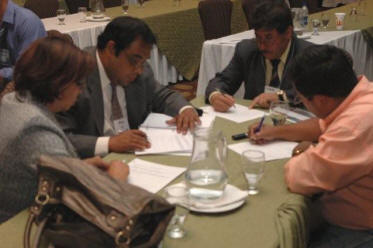 By
Rod Boyd By
Rod Boyd
You wouldn’t be the first LA/C missionary to ask!
CTN (Christian Training Network) is our umbrella for missionary involvement in
education… primarily ministerial training. And yes, each missionary gives $30
per month as part of his or her team contributions. We noticed it on our
monthly statement the first two or three months, wondered what it was, then
forgot about. But for me, the $30 serves as a monthly reminder of our
commitment to ministerial training.
Lessons from History
Several months ago, Dick Nicholson shared with the
ACLAME missionary family the article
Why Is Ministerial Training Important in LAC? One of his conclusions
from studying the growth of the Assemblies of God in LA/C is that “teaching
is fundamental to the growth of the Church everywhere!” He then encouraged
every missionary to get involved in teaching.
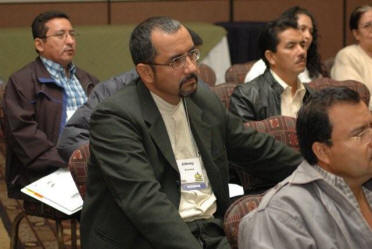 Dorothy
Cederblom wrote an excellent article several years ago,
Teaching Believers to Participate in the Eternal Plan of God. She
shares three fundamental principles that she had observed in the development of
ministerial training: Dorothy
Cederblom wrote an excellent article several years ago,
Teaching Believers to Participate in the Eternal Plan of God. She
shares three fundamental principles that she had observed in the development of
ministerial training:
-
All believers are called to be workers for God
-
Workers must have accessibility to studies
-
Each teacher has the responsibility of sharing his
life and being a mentor to his students.
She concludes,
“Certainly God has blessed
the work of the Assemblies of God in Latin America. The Bible schools and other
training programs have produced workers and godly leaders, and our growth has
been phenomenal.”
It might be overstating things to say that ministerial
training produced this phenomenal growth. Still, we must recognize that
effective ministerial training is required to sustain growth.
Evolution of Educational Ministries and Missionary
Involvement
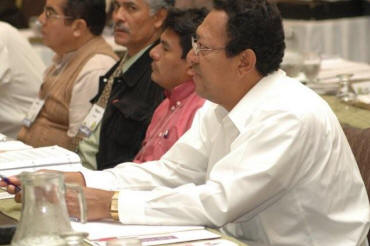 As
advisor to the Bible schools for SEC (Servicio de Educación Cristiana)
and director of the Resource and Advisory Center, we try to keep our finger on
the pulse of ministerial training. Every two years we meet with national
directors and key missionaries. In addition, in the last two years we’ve
conducted Strategic National Dialogues (Diálogo Estratégico Nacional)
with Bible school leaders and executives on a national level in four countries.
Next week we’ll be meeting with the leaders of Honduras. Some changes and
concerns that we have heard and observed are: As
advisor to the Bible schools for SEC (Servicio de Educación Cristiana)
and director of the Resource and Advisory Center, we try to keep our finger on
the pulse of ministerial training. Every two years we meet with national
directors and key missionaries. In addition, in the last two years we’ve
conducted Strategic National Dialogues (Diálogo Estratégico Nacional)
with Bible school leaders and executives on a national level in four countries.
Next week we’ll be meeting with the leaders of Honduras. Some changes and
concerns that we have heard and observed are:
- In many countries there is a lack of
national coordination of Bible school ministry resulting in the lack of a
unifying vision and plan
- Our “central” Bible schools are losing
attendance and are scrambling to survive while our extension Bible schools
are flourishing
- Some of our countries are struggling with
the idea of allowing the laity to attend
- The relationship between Bible schools and
the local churches and pastors needs improvement
- The Bible school thinks its job is done
when a person graduates
- Our Bible schools are competing with
“diploma mills” and local church “schools of leadership”
- Our Bible schools are feeling pressured to
seek accreditation
- Our libraries and the appreciation and
integration of textbooks in general are weak
- Very few Bible schools have missionaries
as directors, but many missionaries are involved in Bible school, teaching
mostly.
|
PIONEER |
SUPPORT |
|
Less structure |
More structure |
|
Innovation |
Institution |
|
Lead |
Support |
|
Authority |
Influence |
|
Generalist |
Specialist |
|
Parent |
Grandparent |
Most of these changes and concerns result from the
growth of the church and changes of society in general. The role of the
missionary is also changing, as it should. Pioneer missionaries of previous
generations are replaced by missionaries who are now serving in support roles.
The chart to the right contrasts the change of role. This transition has not
been easy and has not always been managed in the best way. Just as parents
struggle with the transitions from childhood (dependence) to adolescence
(independence) to adulthood (interdependence?), so we struggle with not only
“letting go,” but also with how we should relate to our “adult children.” We
need the wisdom of the Holy Spirit to know how to stay connected to our Bible
schools and stay involved in ministerial training.
Our Commitment to Ministerial Training
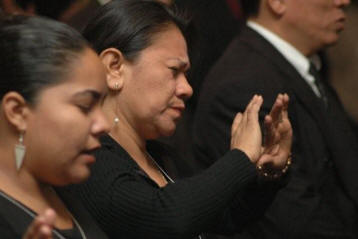 Could
it be that today in Latin America and the Caribbean, where most of our national
churches enjoy strong leadership, that our highest calling may be ministerial
training? Even if we’re not in charge, our national brethren still hold in high
esteem the title missionary. Let’s ride the “coattails” of the previous
generations of pioneer missionaries by continuing to teach, to disciple and to
mentor leaders and future leaders. This investment will pay long term
dividends! Could
it be that today in Latin America and the Caribbean, where most of our national
churches enjoy strong leadership, that our highest calling may be ministerial
training? Even if we’re not in charge, our national brethren still hold in high
esteem the title missionary. Let’s ride the “coattails” of the previous
generations of pioneer missionaries by continuing to teach, to disciple and to
mentor leaders and future leaders. This investment will pay long term
dividends!
Recent movements have threatened the traditional
structures of ministerial education in many countries. Those missionaries that
are involved and connected in these structures are able to provide stability and
needed protection. Our example of servant leadership is more important now than
ever.
Let’s Get Involved!
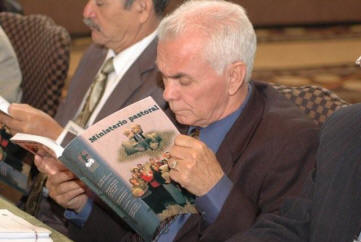 Not
every missionary will direct a Bible school. In fact, it would be impossible...
we have too many Bible schools! But we can all be involved, both formally and
informally: Not
every missionary will direct a Bible school. In fact, it would be impossible...
we have too many Bible schools! But we can all be involved, both formally and
informally:
-
Be a teacher… volunteer to teach in your local Bible
school; teach a seminar or workshop
-
Be a friend… build relationships with influential
educational leaders
-
Be a learner… take an ISUM class; attend local and
international events
-
Be an initiator… ask, “How can I help?”
-
Be a supporter… invest in important
initiatives—local, national and international
-
Be an advocate… “watch out” for ministerial
education
-
Be a writer… write an article and submit it to
conozca.org or to aclame.net
Thank you, missionary, for your involvement in
ministerial education and for your investment in those you serve.
|

